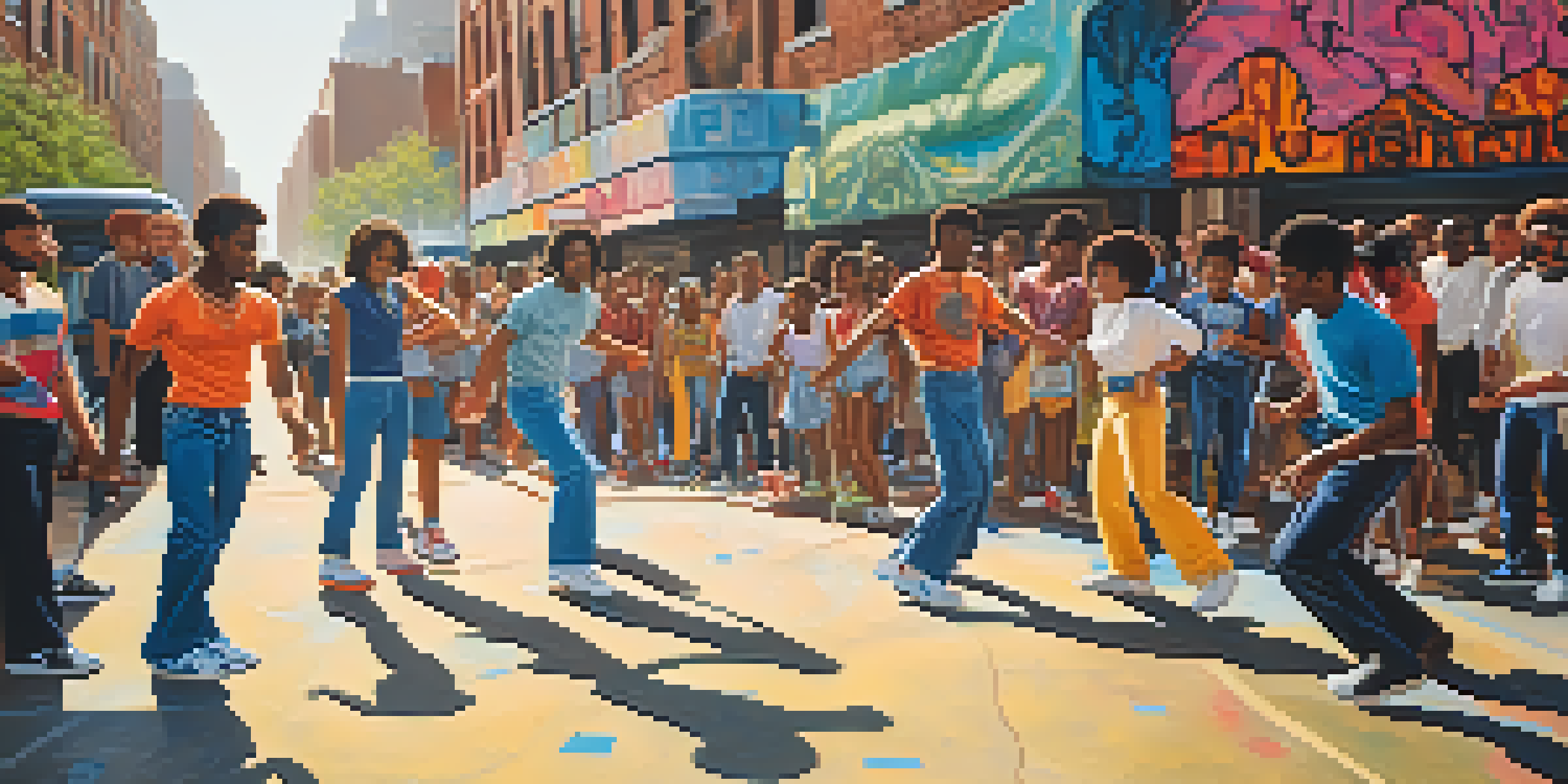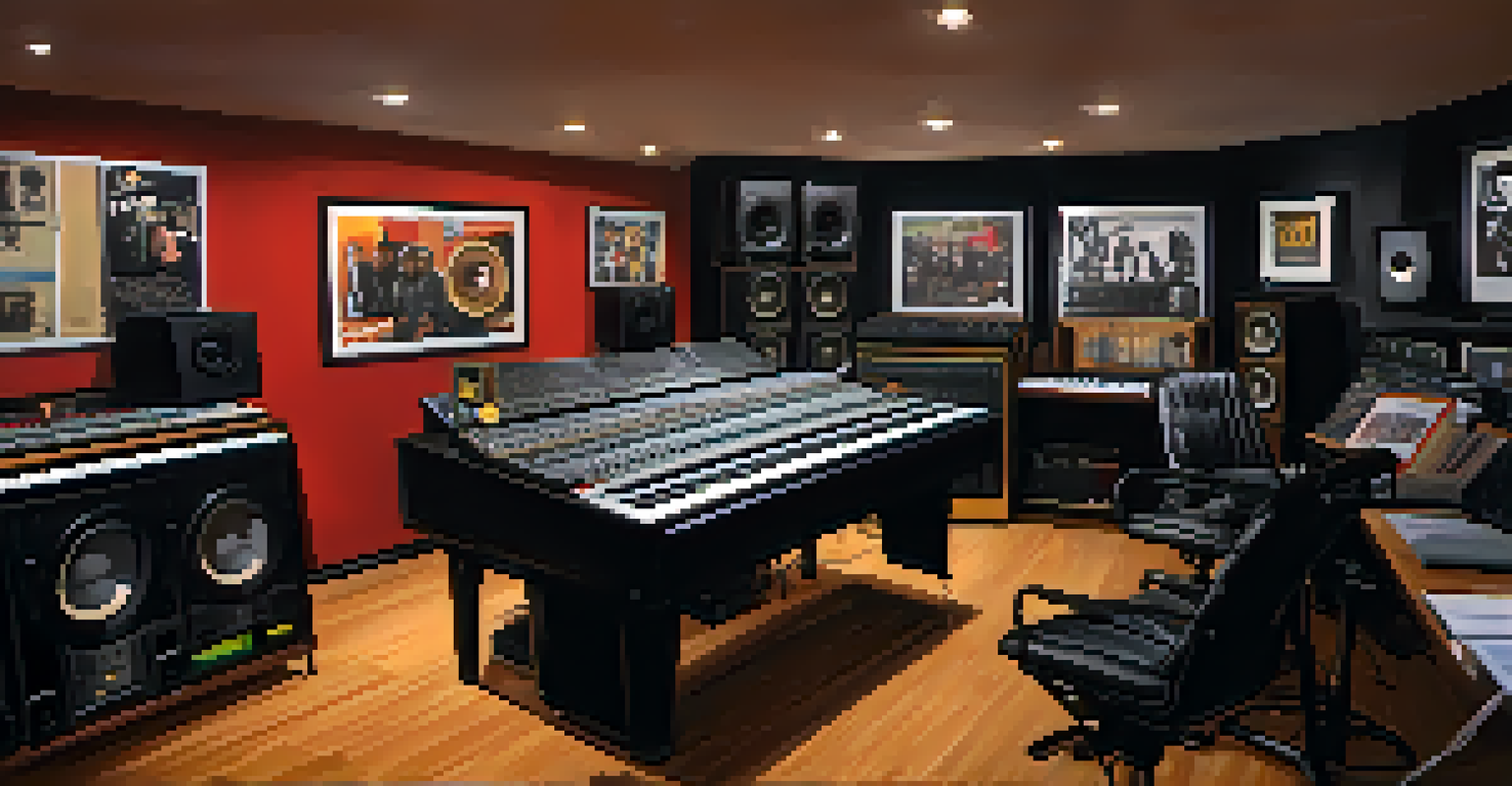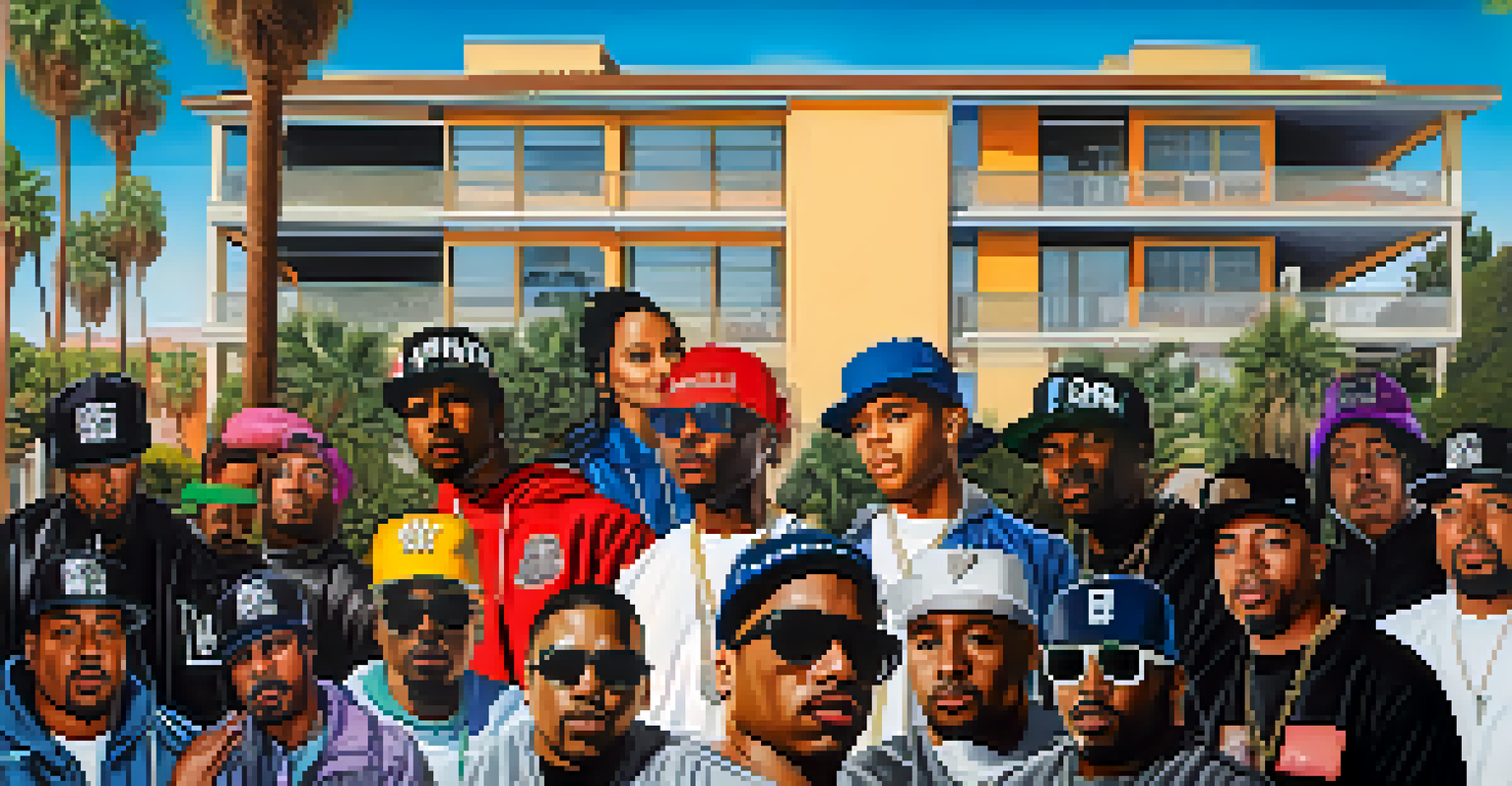The Rise of Hip-Hop: Compton's Influence on Music Culture

The Origins of Hip-Hop: A Cultural Movement
Hip-hop emerged in the 1970s as a vibrant cultural movement, primarily in the Bronx, New York. It combined elements of music, dance, and art, serving as a voice for marginalized communities. The genre was a response to social issues, reflecting the struggles and aspirations of urban life. Over time, its influence spread across the United States, finding a significant home in Compton, California.
Hip-hop is a way for people to express themselves, to shout out their struggles and their dreams, and to tell their stories.
Compton, often seen as the epicenter of West Coast hip-hop, played a crucial role in the genre's evolution. Artists from this area brought their unique perspectives and experiences, enriching the hip-hop narrative. This shift not only diversified the sound but also introduced new themes related to life in Compton, making it a focal point in the hip-hop landscape.
As hip-hop grew, so did its cultural significance, transforming from a localized phenomenon to a global movement. The stories told through lyrics resonated with many, creating a sense of community and identity among fans and artists alike. This laid the groundwork for Compton to rise as a cultural beacon within the hip-hop world.
Compton's Pioneers: N.W.A and Gangsta Rap
The late 1980s saw the emergence of N.W.A, a group that would forever change hip-hop with their unapologetic approach to storytelling. Their debut album, 'Straight Outta Compton,' was a raw, unfiltered glimpse into life in the city, highlighting issues such as police brutality and systemic racism. This shift towards gangsta rap was a defining moment in the genre, influencing countless artists and reshaping hip-hop's narrative.

N.W.A's impact wasn't just musical; it sparked conversations around societal issues that had been largely ignored. Their music gave voice to youth in Compton and beyond, challenging authority and demanding change. The authenticity of their lyrics resonated with listeners, making them pioneers not just in sound but also in cultural commentary.
Hip-Hop's Roots in Compton
Compton emerged as a pivotal center for hip-hop, influencing the genre's sound and storytelling through its artists.
The legacy of N.W.A continues to inspire new generations of artists. Their fearless exploration of difficult topics paved the way for others to share their stories, ensuring that the spirit of Compton's influence remains alive in contemporary hip-hop. This spirit of authenticity and rebellion is still felt in today’s music, proving the lasting power of their message.
The Sound of Compton: Beats and Rhythms
Compton's influence extends beyond its artists to the very fabric of hip-hop production. The signature sounds of the West Coast, characterized by laid-back beats and smooth rhythms, became a staple in the genre. Producers like Dr. Dre played a pivotal role in developing this sound, blending funk, soul, and electronic elements to create tracks that became instant classics.
The beauty of hip-hop is that it can be anything. It's a reflection of our society, our lives, and our culture.
The G-Funk era, popularized by Dr. Dre’s 'The Chronic,' showcased a unique blend of melodic basslines and catchy hooks. This sound not only defined West Coast hip-hop but also influenced artists across the country, leading to a broader acceptance and appreciation of diverse musical styles within the genre. The smooth, relaxed vibe of Compton's beats continues to be a significant influence in modern hip-hop.
As hip-hop evolved, the sounds from Compton adapted and integrated new influences, keeping the genre fresh and exciting. This adaptability reflects Compton's ongoing role in shaping hip-hop music, ensuring that it remains dynamic and relevant. The beats crafted in Compton have become a part of the global hip-hop soundscape, showcasing the city's lasting musical legacy.
Cultural Identity and Representation in Hip-Hop
Hip-hop has always been a platform for self-expression and cultural identity, and Compton’s artists have taken this to heart. Through their music, they narrate their experiences, struggles, and triumphs, creating a rich tapestry of stories that resonate with many. This representation is crucial, as it allows listeners to see themselves reflected in the art, fostering a sense of belonging and understanding.
The cultural identity portrayed in Compton's hip-hop goes beyond music; it encompasses fashion, language, and lifestyle. Artists often incorporate elements of their surroundings, creating a distinctive style that feels authentic and relatable. By doing so, they not only celebrate their heritage but also challenge stereotypes and misconceptions about their community.
N.W.A's Cultural Impact
N.W.A revolutionized hip-hop with their raw narratives about societal issues, shaping a new era of gangsta rap and cultural commentary.
This commitment to representation has inspired artists worldwide, encouraging them to share their own stories and cultural backgrounds. As hip-hop continues to evolve, the importance of authenticity and representation remains at its core, echoing the voices of those from Compton and shaping the genre's future. Compton's influence serves as a reminder of the power of storytelling in music.
The Global Reach of Compton's Influence
The influence of Compton's hip-hop extends far beyond its borders, reaching audiences across the globe. Artists from various countries have adopted elements of the Compton sound, integrating it into their own music while adding local flavors. This fusion showcases the universal appeal of hip-hop and its ability to connect people from diverse backgrounds through shared experiences.
International artists often cite Compton's pioneers as inspirations, showcasing how a localized movement can have a global impact. From Europe to Asia, the rhythms and messages of Compton's hip-hop have resonated, leading to the rise of new sub-genres and styles. This cross-cultural exchange enriches the hip-hop landscape, making it more vibrant and diverse.
As hip-hop continues to break down barriers, it fosters a sense of community among artists and fans worldwide. The stories and sounds from Compton serve as a foundation upon which new generations can build, ensuring that the city’s influence will be felt for years to come. This global reach emphasizes the genre's role as a unifying force in music and culture.
Challenges and Controversies in Hip-Hop
Despite its incredible success, hip-hop has faced numerous challenges and controversies, especially regarding its portrayal of violence and misogyny. Compton's artists have often been at the center of these discussions, as their lyrics reflect harsh realities that many would prefer to overlook. This has sparked debates about the responsibility of artists in conveying their messages and the impact of their words on society.
Critics argue that some lyrics perpetuate negative stereotypes and glorify a lifestyle that can lead to real-world consequences. However, supporters contend that these artists are merely reflecting their environments and providing an authentic narrative. This dichotomy highlights the complexities of hip-hop as both art and commentary, making it a powerful medium for social critique.
Global Influence of Compton's Sound
The rhythms and messages from Compton's hip-hop have transcended borders, inspiring artists worldwide and fostering a global community.
Navigating these controversies requires artists to strike a balance between authenticity and responsibility. Many from Compton have used their platforms to advocate for change, addressing the very issues their music discusses. This ongoing dialogue keeps hip-hop relevant and encourages both artists and listeners to engage with the deeper meanings behind the lyrics.
The Future of Hip-Hop: Compton's Ongoing Legacy
As we look to the future, Compton's influence on hip-hop remains as vital as ever. New artists continue to emerge from the city, each bringing fresh perspectives and innovative sounds to the genre. This ongoing legacy showcases the resilience of Compton's music scene and its ability to adapt to changing cultural landscapes while staying true to its roots.
The integration of technology and social media has also transformed how hip-hop is created and consumed. Artists from Compton are leveraging these platforms to reach wider audiences, allowing their voices to be heard on a global scale. This democratization of music means that anyone can become a part of the hip-hop narrative, regardless of their background.

Ultimately, Compton's role in shaping hip-hop is a testament to the genre's power as a form of expression and community. As new stories are told and new sounds are created, the city will undoubtedly continue to play a pivotal role in the evolution of hip-hop. The future is bright for Compton and its artists, as they carry the torch of influence forward into the next generation.